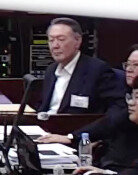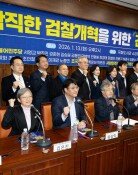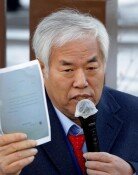Name Change Not to Affect Korean Control of Dokdo
Name Change Not to Affect Korean Control of Dokdo
Posted July. 30, 2008 03:15,
A professor of Korean studies at a French university said yesterday that the U.S. government and military have described the Dokdo islets as Liancourt Rocks for a long time.
Lee Jin-myung of Lyon III University also urged a calm response to the dispute over the islets. He has studied most Western maps describing Dokdo from as early as 1851, when the French navy first used the term Liancourt Rocks in a map.
The following is excerpts from The Dong-A Ilbos interview with Lee.
Dong-A: The U.S. Board on Geographic Names has changed its description of the Dokdo islets from Korean territory to undesignated sovereignty. What impact will the change have?
Lee: To describe the Dokdo islets as Liancourt Rocks on a map is not a serious problem. The U.S. had previously used the term Liancourt Rocks to describe Dokdo. Maps used by the CIA and the U.S. Army also use the term. The CIA World Fact Book has always used Liancourt Rocks. The sailing directions published by the U.S. Army Map Service have a category of Liancourt Rocks (Dokdo) (Takeshima). The chart only uses Liancourt Rocks.
Dong-A: Why did the board change the name?
Lee: The boards maps have not been updated. As Korea revised its regulations to denote foreign words in 2000, the names Pusan and Cheju have been changed to Busan and Jeju. The boards Web site, however, still uses the former expressions, proving the agency has yet to reflect changes in description. Such inaccurate description can be an obstacle to military operations. Its also possible that a person in charge saw the news (of the dispute) and changed the reference to Dokdo from Korean territory to undesignated sovereignty.
Dong-A: Does the name change affect Korean sovereignty over the islets?
Lee: Not at all. The name does not influence sovereignty over the islets at all, whether Dokdo or Liancourt Rocks. The islets have long been under Koreas effective control. Korea doesnt need to bring the case to the International Court of Justice. Even if Japan files a lawsuit, Korea doesnt need to go to court. It is Korean territory. That means Korea can just keep controlling the islets. But what Koreans should keep in mind is that they should not be enraged over the name change.
Dong-A: How should Koreans respond?
Lee: Koreans should stay calm. Regardless of the name, Korea has sovereignty over Dokdo under international law. If the president is enraged over the name change and summons the Japanese ambassador to Korea, the dispute over the name change turns into a diplomatic row that is not understandable by third parties. On Dokdo, all nations but Korea and Japan are third parties. If the matter grows into a diplomatic dispute, no nation will stand by either Korea or Japan. Both countries are significant partners to third parties. Other nations will hesitate to support a certain nation in the dispute. What we can do is to wait for the right time to show logical evidence proving Dokdo belongs to Korea to the world.
pisong@donga.com



![[속보]국힘 윤리위, 한동훈 제명 결정…장동혁호 ‘뺄셈 정치’ 가나](https://dimg.donga.com/c/138/175/90/1/wps/NEWS/IMAGE/2026/01/14/133151701.1.jpg)



